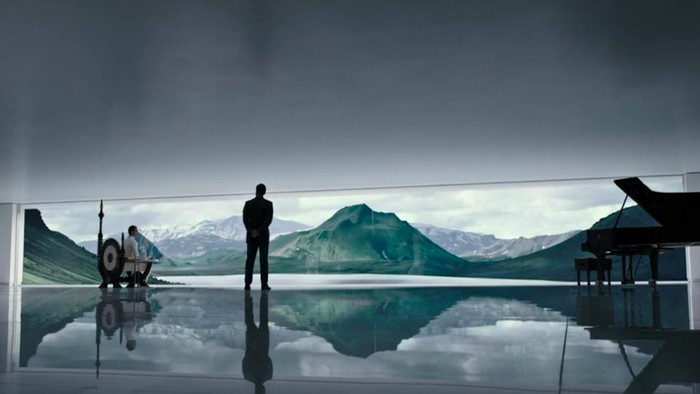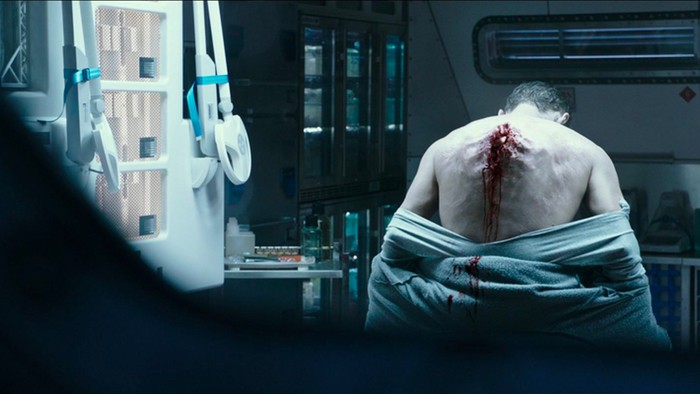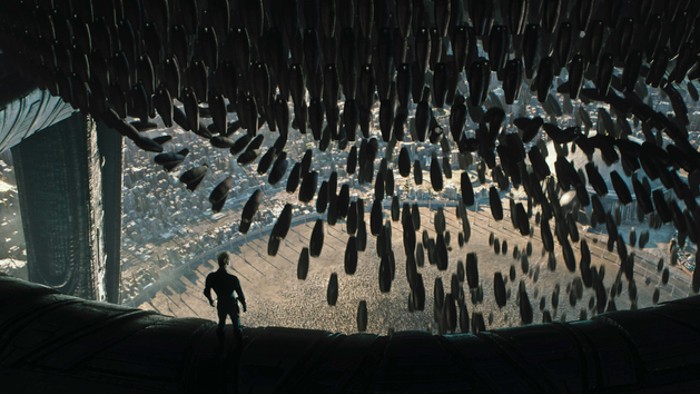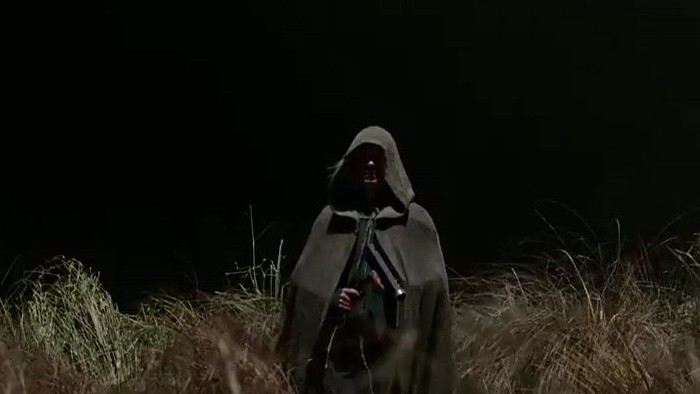'Alien: Covenant' Spoiler Review: Ridley Scott Makes His 'Frankenstein'
(In our Spoiler Reviews, we take a deep dive into a new release and get to the heart of what makes it tick...and every story point is up for discussion. In this entry: Ridley Scott's Alien: Covenant.)In 1979, Ridley Scott unleashed Alien on unsuspecting moviegoers, creating something that would end up becoming iconic in the process. Scott, a filmmaker with a background in graphic design, took what was essentially the type of B-movie that cluttered up drive-in theaters and turned it into something greater – a haunted-house picture set in space, dripping with atmosphere and dread, heightened by grotesque creature designs from nightmare-expert artist H.R. Giger.Alien would turn into a franchise, although Scott stayed away for most of it. He returned for the sort-of prequel Prometheus, one of the most polarizing films of his career. Fans expecting another Alien were sorely disappointed, as Scott no longer seemed interested in the simple, dread-inducing terror of his 1979 film. Instead, the filmmaker wanted to use the Alien mythology as a framework on which to build a more complex, existential examination of the origins of humanity.Scott could've walked away from the Alien franchise after Prometheus, but instead he seems committed to riding this out to see how far it will go. He has returned with Alien: Covenant, which loaded its trailers and promotional material with the familiar xenomorph alien that fans are familiar with. This film, Scott seemed to be saying, would be the Alien-type film Prometheus was not. It was a trick, though. The filmmaker had more complicated, complex ideas in mind. They don't always work, but you have to at least appreciate his willingness to experiment with them at this stage in his career.Spoilers follow.
More Human Than Human
The greatest trick Ridley Scott ever pulled was convincing audiences he was making a new Alien film when he was actually making a subtle sequel to Blade Runner. Much of Alien: Covenant has more in common with Scott's 1982 cult classic than with Alien. Covenant even opens in the same manner as Blade Runner: with an extreme close-up on an eye, followed by an android being put through a test similar to the "Voight-Kampff" test from Blade Runner. The android here, of course, is David (Michael Fassbender), the chilly robot from Prometheus. Here we are witness to David's "birth," as he's brought online by his creator, Peter Weyland, played by an uncredited Guy Pearce, who thankfully isn't buried under old-age prosthetics as he was in Prometheus. In this beautiful but cold and sterile environment, Scott is setting up his film in a distinctly different manner than the other Aliens, revealing to us that this film is not about human beings, or even aliens. This is a film that belongs to David – an inhuman creation struggling to understand his place in a vast universe.Weyland has designed David to be perfect; to learn, and think, and possibly even feel. He's not a tool or a blunt instrument to be exploited for labor. Weyland asks David to play something at the piano, and David jumps into playing a piece from Wagner's Das Rheingold, "Entrance of the Gods into Valhalla." David has had no practice playing this piece, of course – he just knows how. He's been engineered to be not only human-like, but better than human. More human than human, as Blade Runner might put it. But there's one main distinction between David and human beings that he's quick to point out: "You will die," David tells Weyland. "And I will not." The revelation seems to disturb Weyland, and he quickly orders David to pour him a cup of tea in a lame attempt to assert his dominance over the android.
After this intro, Scott jumps into more familiar Alien territory: a crew on a grungy ship, slowly and unknowingly traveling through space to their certain doom. It's a jarring jump from the intro, because at times Scott seems to be attempting to straight-up remake Alien, even going so far as to have Covenant's composer Jed Kurzel recreating Jerry Goldsmith's Alien score over the opening credits. But the characters on board ship Covenant aren't the long-haul space truckers of Alien, nor are they the rough-and-tumble Marines of Aliens. Instead, they're colonists, like pilgrims aboard an intergalactic Mayflower, searching for a new home. They have a destination plotted out. Their destination is a remote planet dubbed Origae-6, and the Covenant has 2,000 colonists and 1,000 embryos onboard. While the crew and the colonists sleep, the ship is maintained by Walter, another android also played by Fassbender, adopting an almost American midwestern accent to contrast with David's posh British one.An accident suddenly interrupts the ship's voyage, leading the crew to be violently awakened from their cryosleep. In some cases, very violently awakened: in one of the film's cheekiest moments, James Franco's character – the captain of the ship – is burned alive in his pod before he even utters a single line. It's a fun bit of stunt-casting on Scott's part, making us assume Franco will have a bigger part only to burn him to a crisp before the film has fully begun. Katherine Waterston plays Daniels, the wife of Franco's character, who is understandably traumatized by her husband's demise. The whole crew is traumatized, of course, and the mission is now in the hands of Oram (Billy Crudup), a nervous self-proclaimed "man of faith" who clearly doesn't seem ready for his new role.While the crew works to repair the ship and get back on track, they receive a ghostly distress call in the form of a woman's voice singing John Denver's "Take Me Home, Country Roads." Never before has a John Denver song seemed so ominous, but the crew is intrigued, and when they realize the transmission is coming from a nearby – and previously undiscovered – planet, they all seem eager to investigate. All except Daniels, who voices objections. Oram rejects her concerns, and the crew descends to the planet. Many of them won't live to regret it.
Entrance of the Gods Into Valhalla
The events aboard the Covenant are fine, but you can tell they're not where Scott's heart lies. He doesn't rush to get to the second half of the film, but once he's there, it's clear this is the material the filmmaker truly wants to focus on. It's here that Alien: Covenant becomes a completely different film – a big, bold gothic horror story set in space, the type of tale that would make Percy Shelley – and Mary Shelley, for that matter – swoon. This is the section of film that will likely turn off fans hoping for another Alien film, but it's actually the most intriguing segment of Alien: Covenant.On the planet, Alien: Covenant devises several nasty ways for the crew to meet a bloody end. If you thought the classic chestburster sequence from Alien was unpleasant, Scott tries to top that twice. First, he concocts a terrifying, tense sequence in which a character becomes infected with an alien parasite only to have a creature known as a "neomorph" – a kind of albino precursor to the xenomorph – burst out of his spine. Almost immediately after this sequence, another character has another neomorph come rupturing out through his mouth, as if he's regurgitating a monster. It's nightmare fuel, and this lengthy sequence shows that Scott still has what it takes to terrify.The crew members who survive are rescued by a cloaked figure who is, of course, David. David takes the crew back to his home, a vast necropolis – a tower housed in a courtyard full of petrified corpses. It looks like something straight out of Gustave Doré's paintings depicting Dante's Inferno. David tells the crew that he and Dr. Elizabeth Shaw (Noomi Rapace) were the only two survivors from the Prometheus mission 50 years ago, and that they landed on this planet after the ship they were on accidentally unleashed a bioweapon on board, killing the planet's inhabitants.David seems uninterested in the human members of the Covenant, but he takes a particular interest in Walter. He invites Walter into his Frankenstein-like workshop, full of billowing curtains, flickering candles and anatomical drawings that would look perfect framed at Guillermo Del Toro's house. David is downright seductive towards Walter, and if you've ever wanted to see Michael Fassbender shamelessly flirt with himself, Alien: Covenant has you covered. The flirtation sequence gives Scott a chance to highlight the differences between David and Walter: Walter can follow commands, but he, unlike David, cannot create. David finds this revelation far more tragic and upsetting than Walter does; he's almost heartbroken at the potential Walter lacks. This sequence once again highlights that Scott is most interested in David – David is the tragic antihero of the Alien prequel saga. He's the Roy Batty, violently reaching out for more life while being unconcerned with the lives he takes in the process.David reveals to Walter that the bioweapon that destroyed all life on the planet was not unleashed by accident – he unleashed it intentionally. He also killed Elizabeth Shaw, using her body to further his ghastly experiments. David has spent the ten years on the planet conducting research and creating life – monstrous life that will eventually develop into the xenomorphs we all love and fear.The neomorphs begin knocking off the Covenant crew, and Oram foolishly finds himself a victim of the facehugger after learning David's true nature. "Take a look," David tells Oram after showing him a basement filled with the familiar Alien eggs. "Perfectly harmless, I assure you." Before you can say "John Hurt," a xenomorph has burst forth from Oram's chest and set its retractable jaws upon the survivors. Daniels tussles with David, who nearly has the upper hand until he's stopped by Walter. Daniels flees, and Scott then reverts the film back into familiar Alien mode, which is unfortunate. One gets the sense that Scott realized the audience might be growing tired of all the gothic melodrama he's been building up and wanting standard chase scenes. Some fans may desire this, but the film starts to run out of steam when it enters its final, predictable act. You want to stand up and shout at the screen, "Bring back the weirdness!"
Look on My Works, Ye Mighty, and Despair
The other Alien films follow a set formula: humans meddle where they shouldn't; slimy, phallic monsters turn them into lunch. Lather, rinse, repeat. Even Prometheus, for all its detractors, stuck to this well-worn path. Perhaps this is why Alien: Covenant seems so thrilling at times. It dares to be different. More than that, it dares to be weird. This film is loaded with big, bizarre ideas that most studio blockbusters wouldn't want to go near. Characters in Covenant succumb to the same foolishness that many of the characters in Prometheus engaged in. That is to say, several characters mindlessly poke and prod mysterious-looking flora and fauna only to have it lead to their horrible deaths. I've already seen several people complaining about this, and wondering why, exactly, the human beings of this film and Prometheus behave so stupidly. I think the answer is simple: human beings are stupid. They make foolish, devastating decisions. If you need proof of that, just take a look at who our current president is – people actually voted for that guy.Scott's thesis with Prometheus and Alien: Covenant seems to be that as a species, human beings are fatally flawed. We are racing towards our own extinction, and apparently incapable of putting on the brakes. It's a nasty, nihilistic theology, and it makes sense that it would turn so many people off. Scott doesn't want to make his audience feel good; he wants us to stop and think, and perhaps realize that it's all kind of hopeless in the end.The two Fassbenders on display here seem to be Scott's way of approaching the warring factions inside himself regarding this franchise. He's like Guy Pearce's Weyland from the beginning, a creator who realizes his creation isn't entirely in his control. And, even more alarming, it will outlive him. Long after Ridley Scott has shuffled off this mortal coil, the Alien franchise will live on, a mutated monster much different than when it was birthed into the world. Walter represents the old-fashioned Alien franchise: he's more straightforward and easy to root for. You want to see him come out ahead when he and David turn on each other. David, in contrast, is the representation of the franchise Scott wants to make now: something dark and twisted, something unsympathetic. David sheds a few tears in this film, but you get the sense that they're not tears of sorrow for others. Rather, he weeps because he knows he will never be understood. You can practically hear him thinking Puck's line from A Midsummer Night's Dream, "Lord, what fools these mortals be!"As a filmmaker, Scott has been incredibly eclectic over his 40-year filmmaking career, yet he's never made a film quite as cerebral as this. Blade Runner comes closest, but even that film doesn't go down the same nihilistic avenues as this one. Screenings of Alien: Covenant would do well to hang signs reading, "Abandon all hope, ye who enter here" above the theater doors. Dariusz Wolski's jaw-droppingly gorgeous cinematography guides us through this hellscape, opening the film up far beyond the claustrophobic corridors the other films tend to stick to. Even more impressive is the fact that several of these locales seem to be practical, and not just CGI creations whipped up by a bank of computers. It's not entirely successful, though. This is a like Frankenstein's creature of a movie, cobbled together from different cadavers to make a shambling monster. The first and third acts are drastically different than the middle, and it shows. The third act of the film has Daniels and another crew member named Tennessee (played by a surprisingly non-comedic Danny McBride) hunting down a Xenomorph that's stowed away on the Covenant. We know exactly how it will end – with the alien being blasted out into space. We also know exactly how a last-minute twist will play out, where the film reveals that the robot the characters think is Walter is actually David, who has killed Walter and taken his place. The predictability hurts the narrative and makes one long to go back and tell Scott to just make an entire movie like the film's second act: a film of gothic horrors and somber poetry set in space.
Deconstructing the Mythology
Since Alien: Covenant is technically a prequel, it trafficks in the same problem other prequels do: it over-explains things that didn't need explaining. It de-mythicizes the mythology. When the characters in Alien found a foggy room filled with giant eggs, audiences were chilled, wondering, "So who is laying those eggs?" James Cameron answered this by introducing the giant, monstrous alien queen in Aliens. Yet here, Scott has David claiming he invented the eggs. So where does the alien queen come in, then? Perhaps it's a chicken or the egg scenario – which came first, the xenomorph or the egg? Revealing that David is the one who created the egg, and by extension the facehugger, saps some of the power away.There are far too many characters in the film, which is a problem that Prometheus also suffered from. The first Alien had a total of seven characters (eight if you want to count Jones the cat), and we knew exactly who all of them were and what made them tick within the first 15 minutes. Alien: Covenant feels like it has approximately fifty characters, and we only get to know about four of them. The rest are simply there to become monster chow, and it weakens the film. Why should we spend time with any of these people if the film barely even takes the time to tell us their names? The entire crew of the Covenant are couples, but Scott neglects to actually tell us this, which seems like something that could've been easily solved with a line of dialogue. Perhaps it'll appear in the inevitable extended director's cut.As for the characters we do get to know, Waterston is great here, and while the film's finale turns her into Ripley 2.0, the character is much different: more fragile, less assured. McBride is also very good, and he and Waterston share an easygoing chemistry that makes you want them to co-star in more films together. Crudup makes the most of his part, which is a bit underwritten. Having him repeatedly say that he's a "man of faith" is lazy exposition, and there was probably a more organic way to develop the character's belief system than just having him tell us about it. But the real standout here is, of course, Fassbender, who is affable and relatable as Walter and delightfully menacing as David.Scott wants to keep this franchise going, hoping to make at least one more sequel and perhaps three more after that. If he follows that path, one would assume he would eventually bring the films more in line with the original Alien franchise. It would be nice if he didn't rush towards that, though. In fact, he would do better to take a step back and attempt something even more ambitious than Alien: Covenant: an entire movie in the same vein as the second act of this film.During the second act of Covenant, David quotes Percy Shelley's poem Ozymandias (he incorrectly attributes it to Lord Byron): "Look on my works, ye Mighty, and despair!" That seems to be the message of Alien: Covenant as well, for both the film itself and the Alien franchise. Decline is inevitable; what was once great will crumble and get lost in the dust. But we need not despair. Instead, we should welcome and embrace what might sprout up in its place. "Big things have small beginnings," David said in Prometheus. Perhaps Alien: Covenant is just the beginning. Who knows what gods and monsters await us further down the line.
